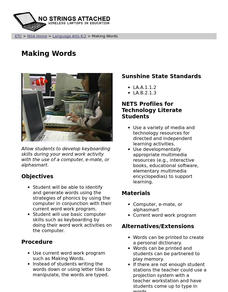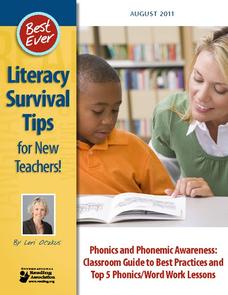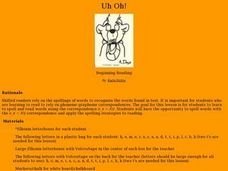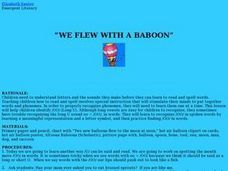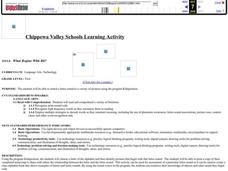Meadows Center for Preventing Educational Risk, University of Texas at Austin
Lesson 2 - Consonant-Vowel-Consonant Words
Closed syllable words contain short vowel sounds. A phonics lessons introduces readers to consonant-vowel-consonant words. Guided instruction introduces the words with a series of dictation activities, and then learners practice reading...
Meadows Center for Preventing Educational Risk, University of Texas at Austin
Lesson 4 - Consonant Blends
Old, ild, ind, and ost may sound like a foreign language, but they actually represent common final consonant blends. Help learners recognize and pronounce consonant blends with step-by-step instructions, including scripted conversations....
Meadows Center for Preventing Educational Risk, University of Texas at Austin
Lesson 7 - Letter Combinations
Individually, letters have their own sounds, but when combined with other letters, those sounds completely change. Introduce letter combinations with a lesson that asks learners to search for combinations in familiar words and use oral...
Meadows Center for Preventing Educational Risk, University of Texas at Austin
Lesson 8 - Open Syllables
Just like scholars plug something in to close a circuit, they must plug a consonant onto a word to make closed syllables. Help learners distinguish between open and closed syllables with a series of activities that emphasize open...
Meadows Center for Preventing Educational Risk, University of Texas at Austin
Lesson 10 - Compound Words
Individually, words have power, but when added together, they can take on a whole other level of meaning. Readers learn about compound words in the 10th of 17 lessons of the Word Recognition and Fluency series. A script provides guidance...
Meadows Center for Preventing Educational Risk, University of Texas at Austin
Lesson 9 - Contractions
Is it do'nt or don't? How about doesn't or does'nt? A activity on contractions helps learners identify, form, and use contractions. Components within the plan include direct instruction on decoding and encoding contractions, as well as...
Curated OER
Learning About Contractions
Students identify contractions. In this phonics lesson, students define what a contraction is and give examples on the board. Students complete a worksheet as a follow-up.
Curated OER
Making Words
Learners add letters to teacher provided endings to make new words. In this phonics lesson, students learn to make new words using word families. A sample worksheet is provided and a rubric
Curated OER
Making Words
Young writers identify and generate words using the strategies of phonics on the Making Words computer program. Words are typed instead of having to use tiles or paper. Extension activities such as playing the memory game, drawing...
Curated OER
Technology that Makes Phonics Fun
Learners discover the Internet by participating in on-line educational activities. In this educational technology lesson, students utilize interactive story books, podcasts, and games to help expand an understanding of phonics....
International Reading Association
Literacy Survival Tips for New Teachers!
Whether new to teaching or a seasoned pro, this 12-page phonics and phonemic awareness guide is a must for your curriculum library. Everything from a summary of research on the topic to exercises and activities is included.
Curated OER
Dr. Seuss - Make Time for Rhymes
Read the story Green Eggs and Ham to practice phonemic awareness, rhyming, and writing skills with emerging readers. They will match oral words to printed words, create a graphic organizer, and the use rhyming words in an original...
Curated OER
Grammar Through Jeopardy
Students create questions for a grammar based version of a Jeopardy quiz game. The teacher assesses student questions and decides which questions should be used in the game. Individuals compete using proper grammar, phonics, and...
Curated OER
Beat the Heat
Review common digraphs with your early elementary schoolers. They identify the digraph /ea/ in written and spoken language. After a brief discussion, they apply the rule for identifying and spelling words containing the /ea/ digraph....
Curated OER
Uh Oh!
Help your elementary learners distinguish between short and long vowel /o/ sounds. They are introduced to the vowel-consonant-e pattern that changes short vowel sounds into long vowel sounds. Then they practice reading and spelling words...
Curated OER
/sh/ Sound Work
What letters create the /sh/ sound? Have your elementary learners study the sound, write different words that use the sound in their letter boxes, and read One Fish, Two Fish, Red Fish, Blue Fish! After this mini-lesson, can your...
Curated OER
My Tooth is Loose
Elementary learners study the /th/ sound as a whole class. First they hear the sound and learn a tongue twister. After practicing together, they write the digraph on their practice paper. Then, to study the words in context, the class...
Curated OER
We Flew With a Baboon
More vowels? Elementary schoolers recognize how vowel patterns change a short vowel sound into a long vowel sound. With an emphasis on the /oo/ that makes the long U sound, kids identify the phoneme and letter combination through...
Curated OER
Build a Word
Students explore new words through letters or letter groups. In this lesson about words, students use index cards to build new words. Each index card contains one letter or letter group. Students utilize different strategies like...
Curated OER
What Begins With Bb?
First graders match letter sounds to pictures they represent. In this matching letter sound lesson plan, 1st graders use the computer program Kidspiration to match the letter sounds to the corresponding pictures. This can be used for 1...
Curated OER
Name That Sound
First graders match different pictures to the correct beginning and ending sounds they go with. In this sound lesson plan, 1st graders will use the computer program Kid Pix to go through a variety of pictures. They then match the picture...
Curated OER
Two Vowels Making one Sound
First graders become word detectives and find words with the vowel combinations: "ee" and "ai". In this phonics instructional activity, 1st graders read the words they find and create pictionaries of the words read.
Curated OER
Using Poetry in Teaching Reading to Special Education Students
A series of well-written activities, these lessons prompt middle schoolers reading below grade level (at a second, third, or fourth grade level) to use poetry to practice basic reading skills. They rhyme, build words, make inferences,...
Curated OER
The Fly Swatter Game
Students are placed in small groups to participate in the "Fly Swatter Game" to reinforce phonetic sounds of letters.










